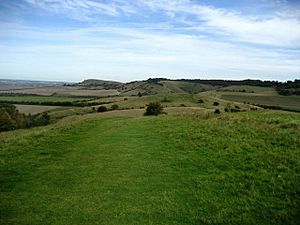Pitstone Hill facts for kids
| Site of Special Scientific Interest | |
 |
|
| Area of Search | Buckinghamshire |
|---|---|
| Interest | Biological |
| Area | 22.9 hectares |
| Notification | 1984 |
| Location map | Magic Map |
Pitstone Hill is a wonderful place for nature in Buckinghamshire, England. It covers about 22.9 hectares, which is roughly the size of 23 football fields! This special area is located east of a village called Pitstone.
Pitstone Hill is part of the beautiful Chiltern Hills Area of Outstanding Natural Beauty. It's also crossed by a famous walking path called The Ridgeway. This makes it a great spot for both nature lovers and hikers.
Contents
A Special Place for Nature
Pitstone Hill is known as a Site of Special Scientific Interest (SSSI). This means it's a protected area because of its unique plants, animals, or geology. The government protects these sites to make sure their special features are kept safe for the future. Pitstone Hill was officially made an SSSI in 1984.
What Makes Pitstone Hill Special?
The hill is mostly covered in chalk grassland. This is a special type of grassy area that grows on chalky soil. It's often found on hillsides and is home to many rare plants and insects. Pitstone Hill also has small areas of woodland and scrub, which are like small forests and bushy areas.
The lower and steeper parts of the hill are the best places to find amazing plants. These areas have the perfect conditions for some very rare species to grow.
Rare Plants and Beautiful Butterflies
You can find some truly special plants on Pitstone Hill. Two of the most famous are the pasque flower and the field fleawort. These plants are considered "nationally scarce," meaning they are rare across the country. It's a real treat to see them here!
Pitstone Hill is also a paradise for butterflies. So far, experts have counted 26 different kinds of butterflies living here! Imagine how many colorful wings you could spot on a sunny day.
Birds That Call Pitstone Hill Home
Many birds choose Pitstone Hill as their home, especially for breeding. This means they build their nests and raise their young here. Some of the birds you might hear or see include skylarks, meadow pipits, and willow warblers. Their songs add to the natural beauty of the hill.
Visiting Pitstone Hill
If you want to explore Pitstone Hill, you can access it from Stocks Road. Remember to stick to the paths and respect the wildlife, as it's a protected area. It's a fantastic place to learn about nature and enjoy the outdoors.
 | Aaron Henry |
 | T. R. M. Howard |
 | Jesse Jackson |

